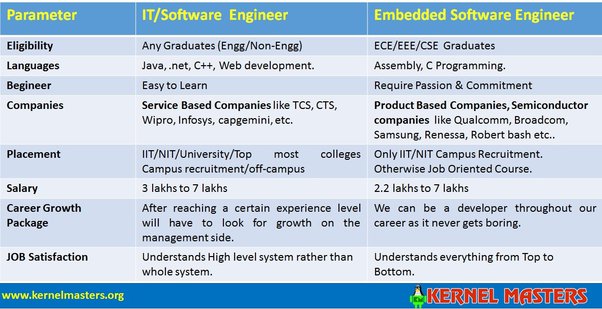
At Google, Software Engineers are solving a wide range of computer science problems. You will build tools, infrastructure, as well as harnesses to increase engineering velocity and product innovation. These engineers love building tools to improve engineering process. They don't like taking shortcuts in code or manual tasks. Instead, they use automation for faster work. Learn more about the job responsibilities, and the benefits for Software Engineers at Google.
Salary ranges
Software engineers make upwards of $135k a year. At Google, engineers work across departments and on key projects. Google is particularly interested in full-stack engineers who have a broad range of skills and experiences. These employees can expect to earn between $81k-$315k annually in salary. Former employees at Google claim there are not many opportunities to grow beyond the software engineer position. Although the company is known for paying high salaries, it's not clear whether top-tier engineers are paid significantly higher.

Hiring process
The hiring process of Google software engineers involves a number of steps. First, the applicant undergoes a thorough screening process. A group recruiters looks over the applicant's CV and checks it for technical abilities, experience, and education. After reviewing the resumes, a group of recruiters screens them for technical skills, experience, and education. The applicants are then contacted for phone screening rounds. The committee meets to discuss the selection process and may debate the decision. The final step is the interview, which lasts anywhere from 30 to 60 minutes, depending on the role.
Bonuses
Google software engineers get a wide variety of salaries and bonuses. For fresh graduates of college, engineers can expect a salary of at least $150,000 and a $30,000 annual bonus. Talented individuals can also receive salary increases. The highest-paid software engineers currently earn over $630,000 annually. This includes a $80,000 annual bonus and $300,000.000 of stock grants. Google software engineers get bonuses on a performance-based basis.
Promotions
Google software engineers are promoted in a similar fashion to university professors. As they gain experience and become more skilled, engineers start out as juniors. There are 11 levels in the company's advancement ladder, with "Senior Computer Engineer" being the lowest. This is the equivalent of an ED at a bank. At this level, engineers are expected to be highly independent and possess excellent interpersonal skills. Some engineers become DSEs (distinguished software engineers). Next is "Sr. Software Engineer", where they lead a team and have a huge impact. Finally, the top-tier engineers reach "Senior VP" and "Sr. Vice President."

Work environment
Google is the best place to find cutting-edge work if you're looking for a career in technology. The company is a highly collaborative and curious organization. Google engineers are excited to tackle tough technology problems. Google is a technology company and is open to taking risks and thinking big. This is not a job where you are just creating products and tools for a few people. Here are some of Google's most well-known practices.
FAQ
Is it possible to run a consultancy business from home?
Absolutely! Indeed, many consultants already do this.
The majority of freelancers work remotely with tools like Skype. They may even create their own office space in order to take advantage of company perks.
Some freelancers prefer working in cafes and libraries over traditional offices.
Some choose to work remotely because they are surrounded by their family.
Of course, working from home has its pros and cons. If you love your job, working from home is definitely something worth looking at.
What was the origin of modern consultancy?
Consultants were originally accountants who could help companies manage their financial affairs. Their skills in managing financial information led to them being called "accounting consultant". But, their role soon expanded to other areas such as human resource management.
The French word meaning "to advise" in French is what gave rise to the term "consultant". This term was originally used by businessmen to denote someone who could give guidance on how to run an enterprise. Today, business owners still use the term consultant to refer to any type of professional advisor.
What is a consultant?
A consultant is someone who offers services to others. Consultant is not just a job title. It's a position where you help people achieve their goals. This involves helping them to understand their choices and making the right choices.
Consultants are experts in finding solutions to the problems and challenges that arise while working on projects. They also provide advice and guidance on how to implement those solutions.
Any questions you have about business, technology and finance, leadership or strategy, human resource management, customer service, customer service, or any other topic, a consultant can answer them.
What skills are necessary for consulting?
A consultant should have strong analytical skills as well as interpersonal skills. This is vital because you may not understand the scope of your work. This is a must because you need to learn how quickly you can manage people.
You also need to have excellent communication skills. Most clients expect a reply within 24 hours. They assume that you won't respond if they don't hear from them within 24 hours. It is vital to inform them and make sure that they are fully informed.
What tax do I have to pay on consulting income?
Yes. You will have to pay taxes on your consulting profits. The amount you earn depends on your annual income.
You can also claim expenses if you are self-employed. This includes rent, childcare, food, and transportation.
You can't deduct the interest on loans, vehicle damage, or equipment costs.
You cannot claim back less than PS10,000 in a given year.
However, you might still have to pay tax if your earnings are higher than the threshold. This depends on whether you are an employee or contractor.
The PAYE tax for employees and the VAT tax for contractors is generally paid as you earn.
How is consulting different from freelancing
Freelancers, who are self-employed and provide services to clients without the need for employees, are independent contractors. They charge hourly rates depending on the amount of time spent on a client's projects. Consultants usually work for agencies or companies that employ them. Their salaries are usually paid monthly or annually.
Consultants have less flexibility than freelancers because they can control their work hours, and set their own prices. However, consultants often have better benefits, such as health insurance, vacation days, sick leave, retirement plans, etc.
Statistics
- 67% of consultants start their consulting businesses after quitting their jobs, while 33% start while they're still at their jobs. (consultingsuccess.com)
- According to IBISWorld, revenues in the consulting industry will exceed $261 billion in 2020. (nerdwallet.com)
- "From there, I told them my rates were going up 25%, this is the new hourly rate, and every single one of them said 'done, fine.' (nerdwallet.com)
- Over 62% of consultants were dissatisfied with their former jobs before starting their consulting business. (consultingsuccess.com)
- Over 50% of consultants get their first consulting client through a referral from their network. (consultingsuccess.com)
External Links
How To
How to start a consulting company and what should I do first?
It's a great way for you to make money online by starting a consulting company. You don't have to have any business experience. Building a website is a great place to start a consulting business. You can use social media platforms like Facebook, Twitter, LinkedIn and Instagram to promote your services.
You can use these tools to put together a plan for marketing that includes:
-
Creating content (blogs)
-
Establishing relationships (contacts).
-
Generating leads through lead generation forms
-
Selling products through ecommerce websites
Once your marketing strategy is developed, you need to find clients willing and able to pay for your services. While some people prefer to attend networking events and groups, others prefer online methods like Craigslist, Wikijiji, or Kijiji. Your choice is yours.
Once you have a new client, you need to discuss terms. This could include hourly fees, retainer agreements, flat fee contracts, etc. You need to be clear about what you expect of a client before they accept you as a client.
An hourly contract is the most popular type of contract for consulting services. This agreement allows you to agree to provide services at a fixed price each week or month. You may be eligible to negotiate a discount, depending on the service that you offer. It is important to understand the terms of any contract you sign before you sign it.
The next step is to create invoices and send them to your clients. Invoicing can be a complicated task until you actually attempt it. You have many options to invoice your clients. For instance, some prefer their invoices to be emailed directly to clients while others prefer hard copies to be mailed. No matter which method you choose to use, it is important that it works for you.
After you've finished creating invoices, you'll want to collect payments. PayPal is preferred by most because it is easy-to-use and offers multiple payment options. Other payment processors, like Square Cash or Google Wallet, Square Cash or Apple Pay, Venmo and Venmo are also available.
Once you are ready for payments to begin, you will need to open bank accounts. You can track income and expenses separately by having separate savings and checking accounts. It is also a good idea to set up automatic transfers into your bank account for paying bills.
Although it can seem daunting when you first start a business as a consultant, once you get the hang of it, it will become second nature. Check out this blog post for more information about starting a consultancy company.
The best way to make extra cash is to start a consulting business. Many consultants work remotely, which means they don't have to deal with office politics or long hours in the office. Since you are not tied down by regular working hours, you have more flexibility than a traditional employee.